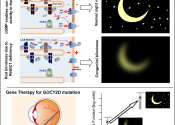New study illuminates why cancers caused by BRCA mutations recur
Researchers at the University of Pennsylvania's Basser Center for BRCA at the Abramson Cancer Center have discovered factors that may make breast and ovarian cancers associated with BRCA1/2 gene mutations more likely to recur.
Nov 10, 2022
0
134









